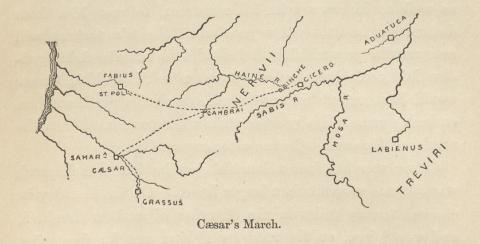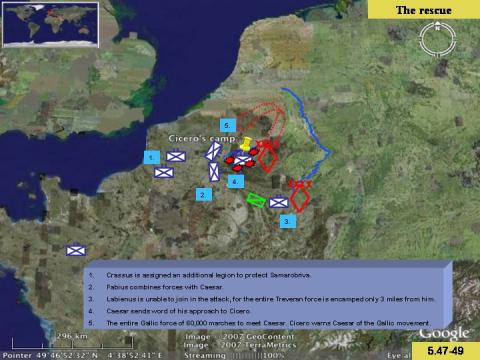Caesar, cōnsiliō ēius probātō, etsī opīniōne trium legiōnum dēiectus ad duās redierat, tamen ūnum commūnis salūtis auxilium in celeritāte pōnēbat. Vēnit māgnīs itineribus in Nerviōrum fīnēs. Ibī ex captīvīs cōgnōscit quae apud Cicerōnem gerantur quantōque in perīculō rēs sit. Tum cuidam ex equitibus Gallīs māgnīs praemiīs persuādet utī ad Cicerōnem epistolam dēferat. Hanc Graecīs cōnscrīptam litterīs mittit, nē interceptā epistolā nostra ab hostibus cōnsilia cōgnōscantur. Sī adīre nōn possit, monet ut trāgulam cum epistolā ad āmmentum dēligātā intrā mūnītiōnem castrōrum abiciat. In litterīs scrībit sē cum legiōnibus profectum celeriter adfore; hortātur ut prīstinam virtūtem retineat. Gallus perīculum veritus, ut erat praeceptum, trāgulam mittit. Haec cāsū ad turrim adhaesit neque ab nostrīs bīduō animadversa tertiō diē ā quōdam mīlite cōnspicitur, dēmpta ad Cicerōnem dēfertur. Ille perlēctam in conventū mīlitum recitat, māximāque omnēs laetitiā adficit. Tum fūmī incendiōrum procul vidēbantur, quae rēs omnem dubitātiōnem adventūs legiōnum expulit.
notes
He sends a dispatch to Cicero.
opinione...deiectus: 'disappointed in his expectation' (Gaisser).
opinione trium legionum deiectus &c.: ‘although he was disappointed in his expectation of three legions, and found himself reduced to only two.’ (Moberly)
duas: Caesar thus had only his own legion and that of Fabius, - a very small force to face the multitude of the enemy. (Allen & Greenough)
magnis itineribus: 'by long marches.' Caesar was in a hurry (Gaisser) ( A&G 409).
Graecis…litteris: we must understand this to mean ‘in the Greek language,’ as we know from Caesar himself (1.29, 6.14) that the Greek characters were well understood in Gaul (Stock); i.e. 'in Greek letters'. The Gauls were well acquainted with the Greek characters. According to Polyaenus (8.23.6) the dispatch contained merely the words, “Caesar to Cicero. Be of good courage. Expect aid.” (Allen & Judson)
intercepta epistola: 'should the letter be intercepted'; the ablative absolute here stands in place of a conditional sentence.[1] ( A&G 420)
tragulam: a heavy Celtic spear (Gaisser).
ammentum: The ammentum was a small strap fastened to the middle of a light spear, in some cases, at any rate, giving it a whirling motion, like the rifle-ball of modern times. By its use the spear could be thrown twice as far and with better aim than without it, as has been proved by experiment. (Allen & Greenough) (Smith)
perlectam...recitat: 'after perusing it he read it aloud in an assembly of the soldiers'. [2]


